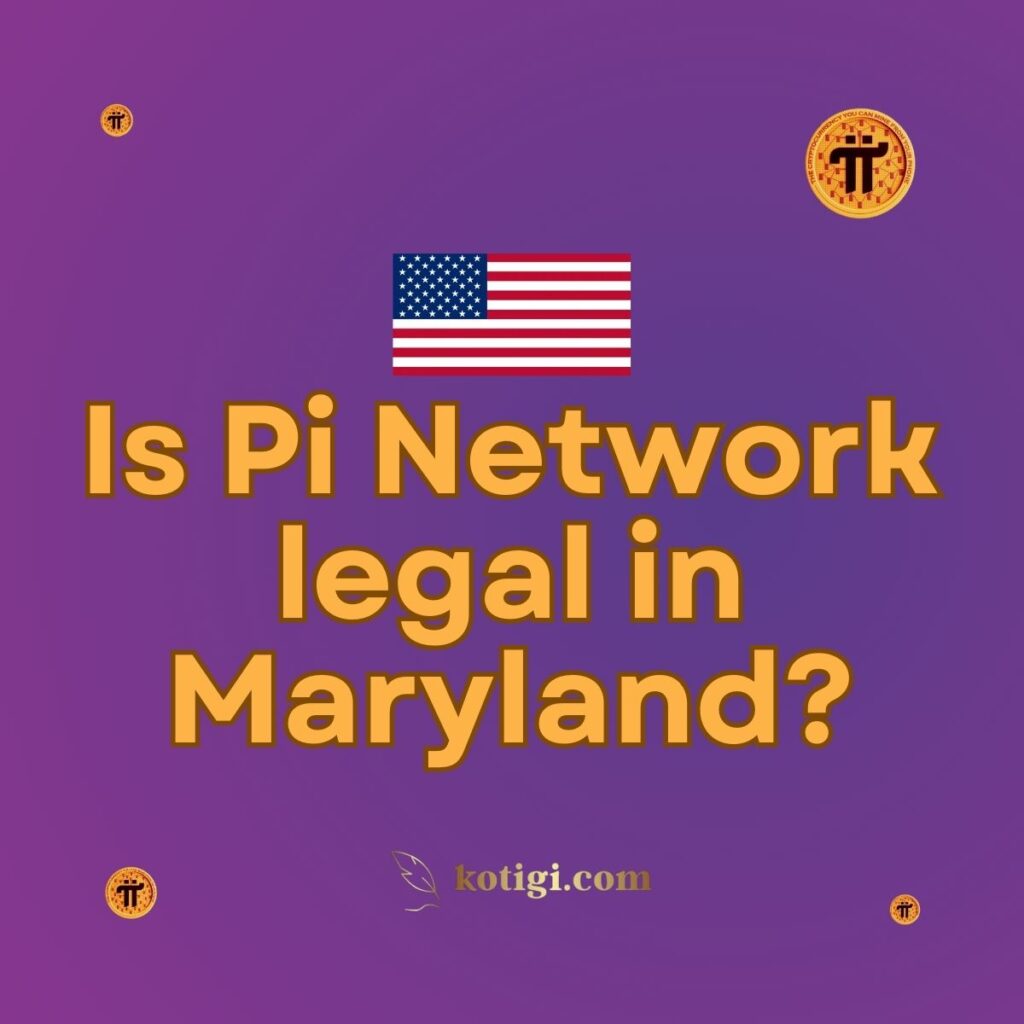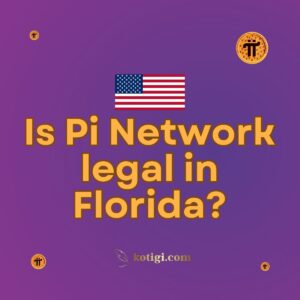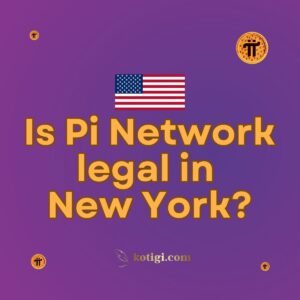
Is Pi Network legal in Maryland?
Yes, Pi Network is legal in Maryland, where participants can mine and interact with the network without facing state-imposed restrictions. While Maryland has yet to introduce cryptocurrency-specific regulations, users are encouraged to follow federal guidelines and practice due diligence to ensure responsible engagement.
Introduction
Pi Network, a mobile-first blockchain project, has gained popularity globally for its accessible cryptocurrency mining model, drawing interest from Maryland residents. With minimal regulatory hurdles, Maryland allows users to participate in Pi Network’s ecosystem without limitations. However, it’s essential to examine both state and federal guidelines to ensure secure and compliant involvement. This guide explores the legal landscape of Pi Network in Maryland, delving into federal oversight, consumer protection, business potential, and sustainability considerations for Pi Network participants in the state.
Understanding Cryptocurrency Regulations in Maryland
Maryland’s General Stance on Cryptocurrency and Digital Assets
Maryland is open to blockchain innovation, although it has yet to establish state-specific cryptocurrency regulations. This means Pi Network and similar platforms can operate freely, provided they comply with general consumer protection and financial laws.
Current Legal Status of Pi Network in Maryland
Pi Network is permitted in Maryland, as no state legislation restricts participation. Marylanders can freely engage in Pi Network’s ecosystem, though users should remain informed about any future legal changes.
Prospects for Blockchain and Cryptocurrency Legislation in Maryland
Maryland may introduce cryptocurrency regulations in the coming years as digital currencies become mainstream. With federal guidance emerging, Maryland may adopt rules to protect consumers, especially as blockchain applications expand in the state.
Federal Oversight and Its Implications for Maryland Residents on Pi Network
SEC Classification of Cryptocurrencies and Pi Network’s Non-Tradable Token
The Securities and Exchange Commission (SEC) regulates digital assets classified as securities. Since Pi tokens are currently non-tradable, they are not subject to SEC scrutiny. Maryland residents, however, should stay informed, as this could change if Pi tokens gain a tradeable value.
IRS Tax Guidelines for Digital Assets and Pi Network Users
The Internal Revenue Service (IRS) categorizes digital assets as taxable property. Marylanders currently do not owe taxes on Pi tokens since they are not tradeable. If Pi tokens become exchangeable, however, users must report earnings as taxable income, making accurate record-keeping essential.
Consumer Financial Protection Bureau (CFPB) and Digital Asset Oversight
The Consumer Financial Protection Bureau (CFPB) monitors consumer rights, including within the digital asset space. Maryland residents are encouraged to heed CFPB recommendations on secure financial practices, which apply to any monetary gains derived from cryptocurrency use.
Consumer Protection and Security Measures for Pi Network Users in Maryland
Maryland Consumer Protection Laws and Digital Asset Safety
The Maryland Consumer Protection Act addresses fraud prevention, though it does not currently cover non-tradeable digital assets like Pi tokens. This law offers security to Pi Network participants if token trading becomes an option, adding a layer of user protection.
Best Practices for Securing Pi Network Accounts
Pi Network participants should employ strict security measures, such as using two-factor authentication (2FA) and strong passwords. This ensures that personal data and Pi tokens remain secure, a prudent practice for Marylanders in light of increasing online threats.
Privacy Regulations and Digital Data Protection in Maryland
Maryland has privacy laws that safeguard personal data, and Pi Network users are advised to review Pi Network’s privacy policies. Taking additional security steps, like enabling 2FA and restricting app permissions, further protects participants’ data within the Pi ecosystem.
Economic and Business Potential for Pi Network in Maryland
Economic Potential for Digital Assets like Pi Network
The Pi Network could influence Maryland’s economy positively if Pi tokens become tradeable. Maryland businesses may then explore new digital engagement strategies using Pi Network’s platform, potentially driving local economic growth.
Pi Network and Maryland’s Growing Tech Industry
Maryland’s tech industry has shown interest in blockchain applications, and Pi Network could inspire further growth within the sector. Its low-entry mobile mining model could attract tech startups and entrepreneurs to Maryland’s blockchain space.
Opportunities for Business Integrations and Partnerships with Pi Network
Should Pi tokens achieve tradeable status, businesses in Maryland could use Pi Network for digital rewards or loyalty programs. These partnerships could foster unique consumer experiences, enhancing Pi’s relevance within Maryland’s digital economy.
Sustainability and Pi Network’s Low-Impact Mining Model
Environmental Advantages of Pi Network’s Mobile Mining
Pi Network’s mobile-based mining model requires minimal energy compared to traditional cryptocurrency mining, making it an eco-friendly choice. This aligns with Maryland’s environmental goals, as the state advocates for sustainable practices.
Pi Network’s Compatibility with Maryland’s Green Initiatives
Maryland’s commitment to green initiatives, including renewable energy, resonates with Pi Network’s low-energy approach. Marylanders interested in sustainable tech solutions may find Pi Network’s model appealing, as it allows participation in cryptocurrency without high energy demands.
Sustainable Technology and Pi Network’s Role in Digital Innovation
Pi Network’s low-impact design encourages environmentally-conscious digital participation, which could inspire further sustainable blockchain developments. Maryland’s tech industry could incorporate similar approaches, fostering a more eco-friendly blockchain landscape.
Educational and Community Resources for Pi Network Users in Maryland
University Programs and Blockchain Education in Maryland
Institutions like Johns Hopkins University and the University of Maryland offer blockchain and fintech courses, providing Maryland residents with valuable insights into blockchain technology and its applications within platforms like Pi Network.
Tech Events and Blockchain Conferences in Maryland
Maryland hosts events like the Maryland Tech Council’s meetups and blockchain-focused conferences, where Pi Network participants can network, learn from experts, and stay informed on industry trends, enhancing their understanding of digital currencies.
Online Communities and Resources for Maryland Pi Network Participants
Pi Network users in Maryland can join online forums, social media groups, and blockchain communities to connect with experienced participants. This peer network offers support and insights into Pi Network’s evolving features and potential applications.
Legal and Compliance Considerations for Pi Network in Maryland
Navigating State and Federal Compliance for Pi Network Users
Maryland residents are encouraged to observe both state and federal financial guidelines when using Pi Network. While the state does not regulate Pi specifically, users should keep informed about compliance requirements that may arise as digital assets become more mainstream.
Potential Compliance Requirements for Pi Network Users in Maryland
Future digital asset regulations could require compliance measures for platforms like Pi Network. Maryland participants should follow federal updates, ensuring they remain compliant if Pi tokens become tradeable or regulated by the state.
Data Privacy and Security Practices for Digital Asset Platforms
Maryland’s Data Privacy Laws and Their Impact on Pi Network Users
Maryland enforces data protection laws to secure residents’ information. Pi Network users should familiarize themselves with the app’s privacy policies and adopt secure practices to protect their personal data, aligning with state laws.
Essential Security Tips for Protecting Personal Data on Pi Network
To protect personal information, Maryland users should adopt secure practices such as updating passwords, using 2FA, and avoiding unnecessary app permissions. These measures help secure accounts and support responsible data use on digital platforms like Pi Network.
Conclusion
Pi Network is legal in Maryland, with no state restrictions on participation. Maryland’s open stance on blockchain aligns with Pi Network’s accessible, energy-efficient model, allowing residents to explore digital assets while following federal guidelines. Maryland participants are advised to remain informed on potential regulatory changes, prioritize security, and consider the economic and educational opportunities Pi Network offers. As blockchain technology grows, Pi Network’s presence in Maryland could contribute to the state’s digital economy and inspire broader adoption of sustainable tech practices.
Key Takeaways
- Legal Status: Pi Network is currently legal in Maryland, where residents can participate freely.
- Federal Guidelines: Maryland users should adhere to SEC and IRS guidance on digital assets.
- Consumer Protection: Maryland’s Consumer Protection Act applies to financial security and fraud prevention.
- Economic Growth: Pi Network could drive innovation within Maryland’s tech industry if tokens become tradeable.
- Environmental Benefits: Pi Network’s low-energy mining model aligns with Maryland’s sustainability goals.
- Educational Opportunities: Blockchain courses and local tech events support learning for Maryland participants.





